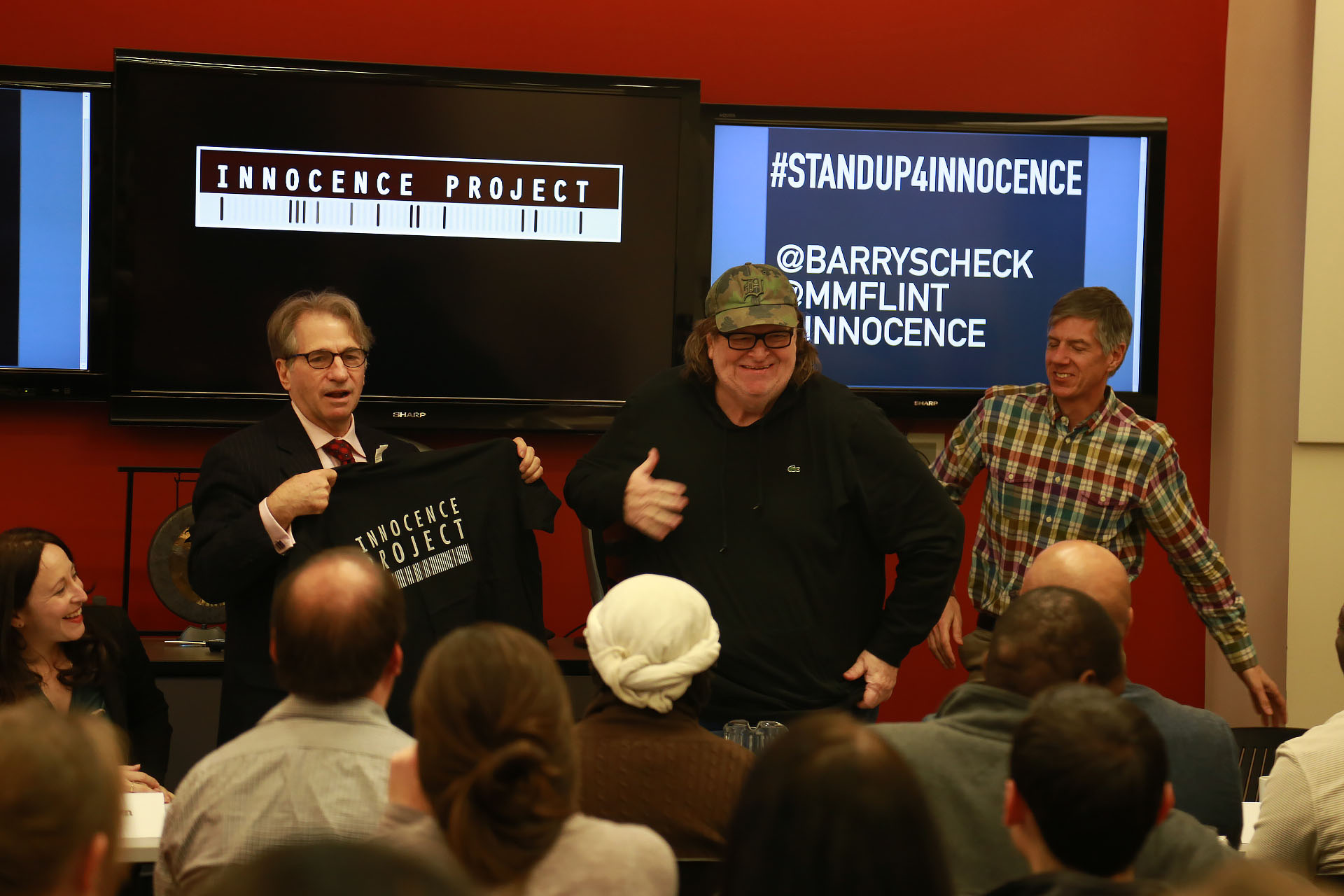Innocence Project Roundtable: Michael Moore, Barry Scheck and New York Exonerees Discuss Injustice in the United States
01.22.16
As we had mentioned earlier this week on the Innocence Blog, on Thursday the Innocence Project
welcomed Academy Award®-winning director Michael Moore to its office to participate in a candid
conversation with Innocence Project Co-Founder and Co-Director Barry Scheck about ways in which the
United States criminal justice system is failing and how to solve it. The jam-packed event brought
together Innocence Project staff and law students, advocates and exonerees for an exciting exchange of
ideas by expert panelists and participants, which included Innocence Project Policy Director Rebecca
Brown, Raymond Santana of the Central Park Five and Sharonne Salaam, mother of Central Park Five
member Yusuf Salaam.
In his recently released documentary,
Where to Invade Next
, Moore documents a trip he made across
Europe to learn about other countries policies’ regarding a range of issues—from paid leave for new
parents to sexual education for youth to policies around drug use—and whether United States should
consider adopting similar policies. At Thursday’s event, Moore said that he believes the film takes a
serious and important turn when it explores issues of criminal justice. For example, he traveled to
Norway to learn about how the country provides true criminal reform while keeping sentences to a
minimum, even for serious crimes. Discussion about his film led into the topic of wrongful convictions,
which is touched on in the film, and the work of the Innocence Project. “It’s shameful that we allow this
to happen,” said Moore.
“I plan to go out across the country in the coming months and spread the word,” said Moore, about the
problems of wrongful convictions and DNA-based exonerations.

New York exonerees Derrick Hamilton, Shabaka Shakur and David McCallum were special guests at the
event. The highlight of the discussion was when they responded to the moderator’s question: “In your
opinion, what steps need to be taken to address and prevent wrongful convictions?”
Shakur said, “One of the problems is lack of accountability. Hardly ever is a prosecutor held accountable
even though we’ve had numerous wrongful convictions. In my [wrongful conviction] case the detective
Scarcella is being investigated for over 70 cases.”
McCallum expressed, “The public can play an important role in stemming the tide for wrongful
convictions.”
Moore apologized to the exonerees and their families who were seated in the front rows.
He also expressed that in his opinion there are other social issues underlying the problem of wrongful
convictions that need to be addressed in order to truly fix the problem. “I don’t think [criminal justice]
it’s going to get entirely fixed until we fix the racial issue and the issue of fear.”
Where to Invade Next
will be released nationally on
February 12th.
Photos by Mattedesign
Leave a Reply
Thank you for visiting us. You can learn more about how we consider cases here. Please avoid sharing any personal information in the comments below and join us in making this a hate-speech free and safe space for everyone.
April 30, 2016 at 8:53 pm

The people who prosecute should be held accountable for wrongful convictions.
They are dealing with people’s lives. Why can a doctor be held accountable and sued when something goes wrong? But our broken judicial system has ZERO accountability!!
You can bet if the cops, detectives, prosecutors and judges were held to the standards that our laws are set to protect they would make sure they had the REAL facts before throwing in the hat so they can have another feather in their cap and send innocent people to jail.
We as people of the United States vote these people into office who are supposed to uphold the law for all citizens. Currently, our broken system upholds the law that each of these judicial crooks set.